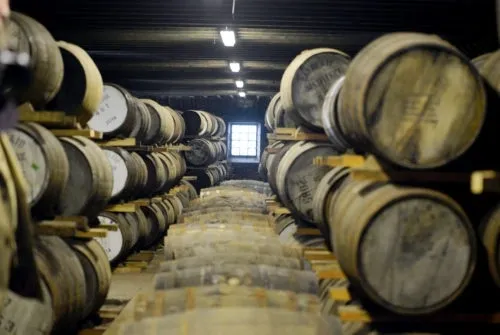27 November 2020|Investing, Latest Posts
How to get started with cask whisky investment
How to get started with cask whisky investment
By Simon Aron of Cask Trade. Buying cask whisky is as easy as getting into any alternative investment. First you decide that you want to diversify out of the normal financial markets (which is not an hard decision to make nowadays).
People have been investing and enjoying alternative assets for years; wine, classic cars, art and now whisky. If in doubt, you can always drink the wine, drive the car and collect the art! But, above all, make money and enjoy the journey.
Cask whisky investors fall into two categories; those that have an interest in whisky and those that can’t stand the smell of the stuff and just want to take advantage of the extraordinary returns in casks of whisky.
A novice can choose to use their knowledge and personal taste preferences, or not. The team at Cask Trade always make it easy for the customer as we provide samples for all our casks as well as individual financial models for each cask selected. After all, each cask is different. Even ones from the same distillery, filled on the same day in the same year into the same type of casks will have matured differently.
The financial models speak for themselves, showing the estimated return at different exit points in a period of 10 years (short /medium/long term hold).
This is an unregulated market with no index at the moment but operates in the same way as any other investment. For those new to cask whisky investment we would recommend a balanced portfolio of slow or fast moving casks depending on what you are looking to achieve.
What are the pitfalls and how to know what’s right for you
When you partner with Cask Trade we are you trusted advisor and we live and breathe whisky and have done for many years. We have decades of experience between us and none of the team are from a banking or sales backgrounds but from all areas of whisky.
Always check your cask company actually owns the stock it’s selling and that they have the correct HMRC licenses to service you legally.
Unlike other forms of trading, whisky takes time. It’s a natural process that matures over a longer period. Whisky is one of the few commodities, along with wine, that appreciates in value with age. You don’t trade whisky to an index and generally nothing happens in less than 2-3 years. For maximum profit we recommend holding onto your cask for 3-10 years.
The main risk at the start is matching the amount you wish to invest to your investment goals (% return and timeline). It’s a bit like buying a 5 year financial product and wanting to come out early, it doesn’t work in your favour. The beauty with whisky is that you can stay in longer and make even more money.
Planning to sell around well-known maturation dates is key. For example, holding an 8 year old whisky until it’s 12 or 15 years old, both dates are recognised as good for sale and bottling.
Some clients are drawn to buy “new make”, which whisky made in 2019/2020 or yet to be filled because of the low financial entry point, but you will have to wait 8-10 years minimum to exit. If you buy old and rare whisky always check its health, how much liquid has been lost to the angels share (natural evaporation of alcohol over time). Check its strength and never let the whisky get too close to the magic 40% alcohol or it won’t be called whisky anymore and the value plummets. It’s always safer to buy a cask from a well-established distillery with a proven track record and lots of previous bottle releases to benchmark its worth. Try and buy a cask that has reached the all-important three year mark so it can called a single malt whisky straight away (whisky must be matured for a minimum of three years before it becomes known as single malt whisky). Always sample your whisky periodically or get us to sample it for you when it’s over 10 years old to check the nose, palette and finish as well as appearance/colour of course.
Cask Trade check all the casks and samples, we provide the full service and have all the legal licenses and expertise to do it. We can offer bottling (with design and packaging) and shipping all over the world.
How much to invest
We have casks priced from £1,500 for a 3 year old to £150,000 for an old and rare cask.
The minimum investment is a £1,500 cask all the way to a portfolio of £150,000 and above.
There are not endless amounts of whisky casks available as they are in limited supply. Our stock changes daily and often sells out. We only sell the investment grade whisky and our stock list reads like a menu; we probably have the best list in the world.
If you are in a position to buy more than one cask, we would recommend a diverse portfolio. For example, casks from different distilleries and from different years/ages/regions/taste and so on. It gives a more balanced portfolio with multiple exit points. Cask Trade will offer a buy back or re-list the casks at your target price for 0% fees or you can put it in our auction (www.auctionyourcask.com) – also 0% fees. You are also free to bottle or sell it on to whomever you wish.
10 key things to consider before investing in cask whisky
It’s an unregulated market and therefore it’s vital to choose a reputable, trustworthy business to invest with that hold all the appropriate licenses.
Buying casks that don’t match your exit strategy.
Not monitoring the maturation of older casks (slow leak, evaporation).
Not diversifying enough to have options on profit taking.
Always consider your investment level in line with your budget.
Be patient to maximise your investment’s potential, if you cash out earlier your profit will be less.
Buying a share or a fraction of a cask is a risk, only one name should be assigned to each cask.
If you invest in a whisky fund you need to understand what the underlying assets of that fund are.
Don’t buy from a company unless they are registered in the UK and have the appropriate HMRC licenses in place, otherwise you won’t have direct access to your cask.
If you buy and sell large quantities of whisky you will be deemed as a ‘revenue trader’ and liable for tax. Always seek tax advice from a professional.
When you can expect to see a return
When you buy a cask from Cask Trade this is the start of your investment journey, not the end. We are in it with you every step of the way and we will offer advice and financial modelling throughout the investment period. Profits can be from 30% to 100% + depending on the time you hold the cask: Short (3 years), Medium (5-7 years) and Long (9+ years).
Above all, we want our customers to take pleasure in their investment; it’s not only about buying a cask and making money it’s about the relationship we build and enjoying the journey.
If this has captured your interest, here are my 10 reasons to invest in cask whisky:
1) Whisky is a top performing luxury investment and far outstrips the more established alternative asset investments such as art, wine and cars. Estimated accumulative short-term returns of 40%, medium term of 80%, and long term 140%.
2) Each cask is unique and only a limited number are available. No two casks will ever be the same.
3) Time is on your side as whisky only matures in the cask. The more mature it gets the more valuable it becomes.
4) There is no index or quoted market for whisky casks as each one is different.
5) Complete transparency – Cask Trade buy each cask first and all the paperwork, location and health of the cask is verified before it ever makes it onto the stock list.
6) Trusted marketplace – Buyers can take Cask Trade’s WOWGR number, go to the warehouse and confirm the cask exists. Bonded warehouses check-in each cask and perform a ‘dip’ test to measure the level of alcohol. Every year, they are required to report to HMRC how many casks they have and the level of alcohol. Casks cannot be faked or fabricated.
7) Casks are safer than storing bottles; the only thing stealing your whisky is the angels.
8) Whisky is a delicious asset and casks are a physical, tangible asset that you own. You can sample them, trade them or even bottle them!
9) Investment Realisation: Cask Trade’s multiple exit strategies and global client base ensures a hassle-free exit from your investment.
10) Cask Trade will arrange for clients to receive samples of their whiskies and visit their barrels(s), upon request, wherever possible.
About the Author:
Simon Aron of Cask Trade is an experienced entrepreneurial angel and investor. He has helped get tech start-ups, medical technology and agricultural ventures around the world off the ground. He is highly experienced in financial modelling, fund management and building companies.
Simon started his first company in 1990. He sold it in 2011, after acquiring a further six more companies. In 1995, he started a commercial property company as an owner and landlord of five office blocks. Those were located in up and coming areas in London, selling out in 2012. As a whisky collector for over 20 years, Simon has acquired over 50 casks and 2000 bottles.
He soon discovered that this ‘hobby’ provided a wonderful business opportunity for trading casks. Simon was intrigued by how rare whisky is surpassing other alternative asset classes, such as art, classic cars and rare wine. And quickly became inspired to more fully understand the whisky market and the risks involved. He brings a wealth of experience to the business. Especially in understanding due diligence and risk management.
- lisafoundersitehttps://thesuccessfulfounder.com/author/lisafoundersite/
- lisafoundersitehttps://thesuccessfulfounder.com/author/lisafoundersite/
- lisafoundersitehttps://thesuccessfulfounder.com/author/lisafoundersite/
- lisafoundersitehttps://thesuccessfulfounder.com/author/lisafoundersite/






